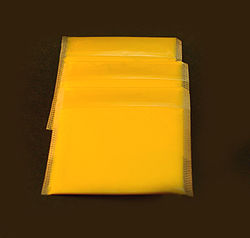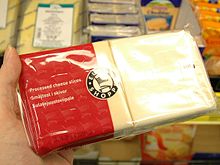- Processed cheese
-
Processed cheese, process cheese, cheese slice, prepared cheese, or cheese food is a food product made from normal cheese and sometimes other unfermented dairy ingredients, plus emulsifiers, extra salt, food colorings, or whey. Many flavors, colors, and textures of processed cheese exist.
In the United States, the most recognizable variety of processed cheese is sold under the name American cheese, although this name also has other meanings. The name American cheese also has a legal definition as a type of pasteurized processed cheese under the U.S. Code of Federal Regulations.[1]
The Laughing Cow is an example of processed cheese.
Although processed cheese was first invented in 1911 by Walter Gerber of Thun, Switzerland, it was James L. Kraft who first applied for an American patent for his method in 1916.[2][3] Kraft Foods also created the first commercially available sliced processed cheese, which was introduced in 1950. This form of sliced cheese and its derivatives have become commonplace in the United States, most notably used for cheeseburgers and grilled cheese sandwiches.
Contents
Advantages
Processed cheese has several technical advantages over unprocessed cheese, including extended shelf-life, resistance to separation when cooked, and uniformity of product. Its production also enjoys significant economic advantages over traditional cheesemaking processes, most often through the ability to incorporate any of a wide variety of less expensive ingredients.
The use of emulsifiers in processed cheese results in cheese that melts smoothly when cooked. With prolonged heating, unprocessed cheese will separate into a molten protein gel and liquid fat; processed cheese will not separate in this manner. The emulsifiers, typically sodium phosphate, potassium phosphate, tartrate, or citrate, reduce the tendency for tiny fat globules in the cheese to coalesce and pool on the surface of the molten cheese.
Because processed cheese does not separate when melted, it is used as an ingredient in a variety of dishes. It is a popular addition to hamburgers, as it does not run off, nor does it change in texture or taste as it is heated.
Disadvantages
Processed cheese is often criticized for its possible health effects (associated with chemical preservatives, artificial colors/flavors, and trans-fats), inferior taste, and small range of flavors, which is far narrower than the range for unprocessed cheeses and normally very mild[citation needed].
Sale and labeling
Processed cheese is often sold in blocks, spray cans, or packed in individual slices, sometimes with plastic wrappers or wax paper separating them.
Legal issues
Due to the processing and additives, some softer varieties cannot legally be labeled as "cheese" in many countries, including the United States and United Kingdom, and so are sold as "cheese food", "cheese spread", or "cheese product", depending primarily on the amount of cheese, moisture, and milkfat present in the final product.
In the United States processed cheese is defined, categorized, and regulated by the Food & Drug Administration under the U.S. Code of Federal Regulations Title 21 (Food and Drugs), Section 133 (Cheeses and Cheese Related Products).[1][4] Pasteurized process cheese can be made from a single cheese or a blend of several cheeses. Cream, milkfat, water, salt, artificial color, and spices may also be added. The mixture is heated with an emulsifier, poured into a mold, and allowed to cool. The definitions include:
 A gift pack containing several varieties of labeled process cheese.
A gift pack containing several varieties of labeled process cheese.
Upper left: a "Pasteurized Process Cheese Food" and a "Pasteurized Processed[sic] Cheese Spread"
Upper Center: a "Pasteurized Process Cheese Spread Havarti-Type Flavor"
Lowermost Right: a "Pasteurized Process Cheese Food with Jalapeño Peppers"- Pasteurized process cheese, which is made from one or more cheeses (excluding certain cheeses such as cream cheese and cottage cheese but including American cheese), and which may contain one or more specified "optional ingredients" (includes both dairy and nondairy items). Moisture and fat content percentage requirements vary according to standards for constituent cheeses, but in most cases fat content must be >47%.
- Pasteurized process cheese food, which is made from not less than 51% by final weight of one or more "optional cheese ingredients" (similar to the cheeses available for Pasteurized process cheese) mixed with one or more "optional dairy ingredients" (milk, whey, etc.), and which may contain one or more specified "optional ingredients" (nondairy). Moisture must be <44%, and fat content >23%.
- Pasteurized process cheese spread, which is made similarly to Pasteurized process cheese food but must be spreadable at 70° F. Moisture must be between 44% and 60%, and fat content >20%.
The US Food & Drug Administration does not maintain a standard of identity for "Pasteurized Prepared Cheese Product", a designation which particularly appears on many popular Kraft products (as well as some others). Neither does the FDA maintain a standard of identity for "Pasteurized Process Cheese Product" (emphasis on the trailing "Product"), a designation which appears particularly on many American store- and generic-branded singles. Products labeled as such may therefore use milk protein concentrate (MPC) in the formulation, an ingredient which does not appear in the above FDA definitions. The desire to use inexpensive imported milk protein concentrate is noted as motivation for the introduction of these and similar terms, and for the relabeling of some products.[5][6] After an FDA Warning Letter protesting Kraft's use of MPC in late 2002,[7] some varieties of Kraft Singles formerly labeled "Pasteurized Process Cheese Food" became "Pasteurized Prepared Cheese Product", Velveeta went from "Pasteurized Process Cheese Spread" to "Pasteurized Prepared Cheese Product", and Easy Cheese went from "Pasteurized Process Cheese Spread" to "Pasteurized Cheese Snack".
American cheese
The best known processed cheese in the United States is marketed as American cheese by Kraft Foods, Borden, and other companies. It is orange, yellow, or white in color and mild in flavor, with a medium-firm consistency, and melts easily. It is typically made from a blend of cheeses, most often Colby and Cheddar.
Notes
- ^ a b Under the U.S. Code of Federal Regulations Title 21 (Food and Drugs), Article 133, Section 169 (Pasteurized process cheese), the allowed usage of the term "American Cheese" for certain types of "Pasteurized process cheese" is detailed. Specifically, in paragraph (e)(2)(ii) of section 133.169, it states In case it is made of cheddar cheese, washed curd cheese, colby cheese, or granular cheese or any mixture of two or more of these, it may be designated "Pasteurized process American cheese"; or when cheddar cheese, washed curd cheese, colby cheese, granular cheese, or any mixture of two or more of these is combined with other varieties of cheese in the cheese ingredient, any of such cheeses or such mixture may be designated as "American cheese."U.S. Food and Drug Administration (April 1, 1999). "Title 21, Article 133". U.S. Government Printing Office. http://www.access.gpo.gov/nara/cfr/waisidx_99/21cfr133_99.html. Retrieved 2007-02-17.
- ^ "Emmi Fondue AG - Gerber - Geschichte:". Emmi Fondue AG. http://www.emmi-gerber.ch/deutsch/gerber/geschichte/. Retrieved 2009-10-17.
- ^ "Patent reference at Kraft Foods". Kraft Foods. Archived from the original on 2007-02-07. http://web.archive.org/web/20070207055521/http://www.kraft.com/100/innovations/kraftcheese.html. Retrieved 2007-02-17.
- ^ Refer to U.S. Code of Federal Regulations Title 21 (Food and Drugs) Article 133 (Cheeses and Cheese Related Products) at the U.S. Government Printing Office.
- ^ U.S. Imports of Concentrated Milk Proteins: What We Know and Don't Know?, Jesse, Marketing and Policy Briefing Paper No. 80, Department of Agricultural and Applied Economics, College of Agricultural and Life Sciences, University of Wisconsin-Madison Cooperative Extension, University of Wisconsin-Extension, February 2003. Accessed 8 February 2010.
- ^ What is 'Real Kraft Cheese'?Chicago Business, February 5, 2007. Accessed 9 February 2010.
- ^ WARNING LETTER CHI-6-03, U.S. Food and Drug Administration to Kraft Foods North America, Inc. 18 December 2002. Accessed 9 February 2010.
External links
- American Chemical Society article on processed cheese.
- From Cheese to Cheese Food: How Kraft persuaded Americans to accept cheese by divorcing it from its microbe-laden origins.
- Calories in Cheese
Cheese Types Acid-set · Blue · Cream cheese · Goat · Pasta filata · Processed · Smear-ripened · Smoked · Washed-rind · Whey
Animal milk Cow · Goat · Sheep · Water buffalo · YakCountries Processed cheese American cheese • Brânză topită • Cheese spread • Cheez Whiz • Chesdale Cheese • Cup cheese • Dairylea (cheese) • Easy Cheese • Imitation cheese • Kraft Singles • James L. Kraft • Pimento cheese • Pizza cheese • Primula (food) • Provel cheese • The Laughing Cow • Velveeta
American cheeses Alouette (cheese) • American cheese • Baby Swiss • Bergenost • Brick cheese • Buffalo mozzarella • Cheese curds • Colby cheese • Colby-Jack • Cream cheese • Creole cream cheese • Cuba cheese • D'Isigny (cheese) • Hoop cheese • Humboldt Fog • Kunik cheese • Liederkranz cheese • Maytag Blue cheese • Monterey Jack • Muenster (cheese) • Pepper jack cheese • Pinconning cheese • Red Hawk (cheese) • String cheese • Swiss cheese • Teleme cheese • Wisconsin cheese
Categories:- American cheeses
- Processed cheese
Wikimedia Foundation. 2010.


